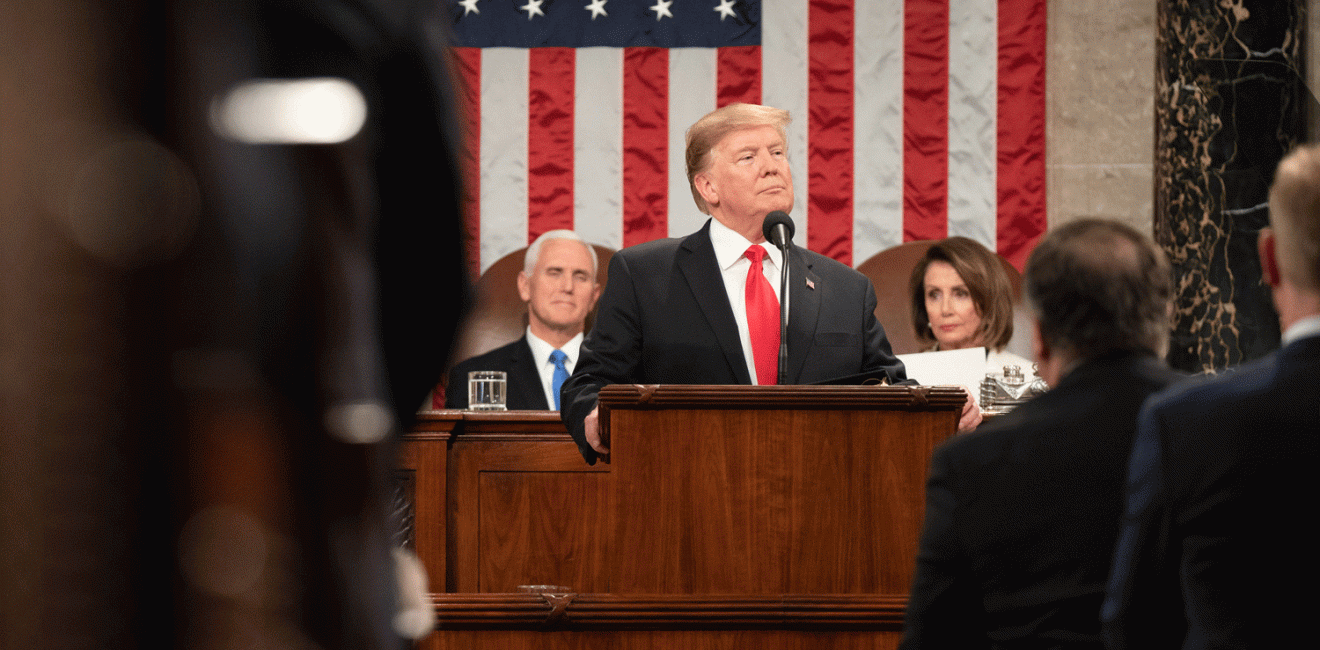Wilson Center Experts React to President Trump's State of the Union Address
Wilson Center experts react to President Trump's State of the Union address.
Wilson Center experts react to President Trump's State of the Union address.

Michael Kugelman, Deputy Director and Senior Associate for South Asia, Asia Program:
"President Trump suggests that the success of U.S. military power forced the Taliban to the negotiating table. That is some magical thinking for the ages. In fact, the failure of U.S. military power forced the U.S. to the negotiating table. In the end, the few words about Afghanistan were perfectly reasonable, quite noncontroversial, and remarkably conciliatory: 'Let's try to make a deal with the Taliban.'"
Duncan Wood, Director, Mexico Institute:
"President Trump’s SOTU speech had a number of direct implications for bilateral affairs. His allusion to the 'very dangerous,' 'lawless' southern border will incense a lot of Mexicans, in particular, because Trump has referenced Mexico in the same breath as Afghanistan in recent days. The kind of inflammatory rhetoric about migrants will hardly mollify the more nationalist, anti-American voices within President AMLO’s MORENA party. On the other hand, the President’s support for his own USMCA will please Mexican officials who want to see the agreement ratified quickly in Congress. However, the obvious lack of enthusiasm on the part of the Democrats, either for collaborating with the president or for ratifying the USMCA, has caused dismay in Mexico and is a bucket of cold water on the hopes of business and investors who are looking for trade certainty."
Cynthia Arnson, Director, Latin American Program:
"The mention of Venezuela — one of only a handful of countries singled out by name — reflects the Trump administration’s high-stakes game to force a democratic transition there. It signals how high a priority this has become for the White House. That begs the question of what comes next if the measures adopted to date — recognizing interim president Juan Guaidó, and imposing oil and financial sanctions — fail to produce regime change. There does not seem to be a ‘plan B.’ The president could have left well enough alone, issuing a resounding defense of Venezuelan democracy and condemning the current regime’s brutality. But instead, in classic Trump fashion, he used the opportunity to skewer his opponents — Bernie Sanders, especially — by launching a broadside on 'socialism in our country.' One hand gives, the other takes away." "On immigration, Trump tried to have it both ways — expressing sympathy for victims of human trafficking and those exploited by unscrupulous coyotes, and at the same time portraying immigrants as security threats to U.S. citizens. Most studies have indicated that legal and undocumented immigrants commit crime at a lower rate than their U.S-born counterparts and that immigrants made a positive economic impact overall."
Robert Daly, Director, Kissinger Institute on China and the United States: "President Trump made only passing mention of China in his 2019 State of the Union address. The low priority given to China was striking because, over the past year, the Trump administration has consistently identified the PRC as the United States’ greatest long-term strategic challenge. If China is the threat which the 2017 National Security Strategy and Vice President Pence’s October 2018 speech claimed it to be, China policy might have merited at least a full paragraph in the SOTU. As is was, President Trump’s brief warning that Chinese theft of American intellectual property, wealth, and jobs must end, followed by his declaration of respect for Xi Jinping, seemed more like an olive branch than a shot across the bow. Beijing will not be displeased. President Trump also mentioned that China might be included in a new multilateral agreement to replace the INF Treaty — an idea Beijing had rejected before the speech was delivered."
Abraham Denmark, Director, Asia Program: "Regarding the President’s decision to withdraw from the INF Treaty, he said, “Perhaps we can negotiate a different agreement, adding China and others, or perhaps we can’t…” Ground-based missiles are a major element of China’s military capability, and over 90 percent of them would not be compatible with the INF treaty. There is a 0% chance that China would sign on to this." "The President will again meet with North Korean leader Kim Jong Un, this time in Vietnam. Their first meeting in Singapore did not result in any tangible progress toward North Korea’s denuclearization, and North Korea has continued to develop nuclear weapons and ballistic missiles. More recently, Director of National Intelligence Dan Coats stated that North Korea is unlikely to give up its nuclear weapons program, noting that North Korea’s leaders see those weapons as essential for regime survival. The question this time is if Kim will give up anything substantive short of complete denuclearization, and what concessions the president may make in the process." "Finally, the Trump’s administration’s key strategic documents — the National Security Strategy and the National Defense Strategy — were filled with descriptions of the United States embroiled in a great-power competition with China and Russia. There’s some very good writing and analysis in these documents about the malign interests of these countries and the threat they pose to American interests around the world. Yet it was striking that the president’s remarks said nothing about great-power competition. China was cast entirely through the lens of the trade dispute, and the president even said he doesn’t blame China’s leaders for their actions. Russia similarly was cast in a very narrow lens. There was nothing in the speech about great-power competition, or a strategy for the United States to win. To me, from a foreign policy perspective, this was the dog that didn't bark."








